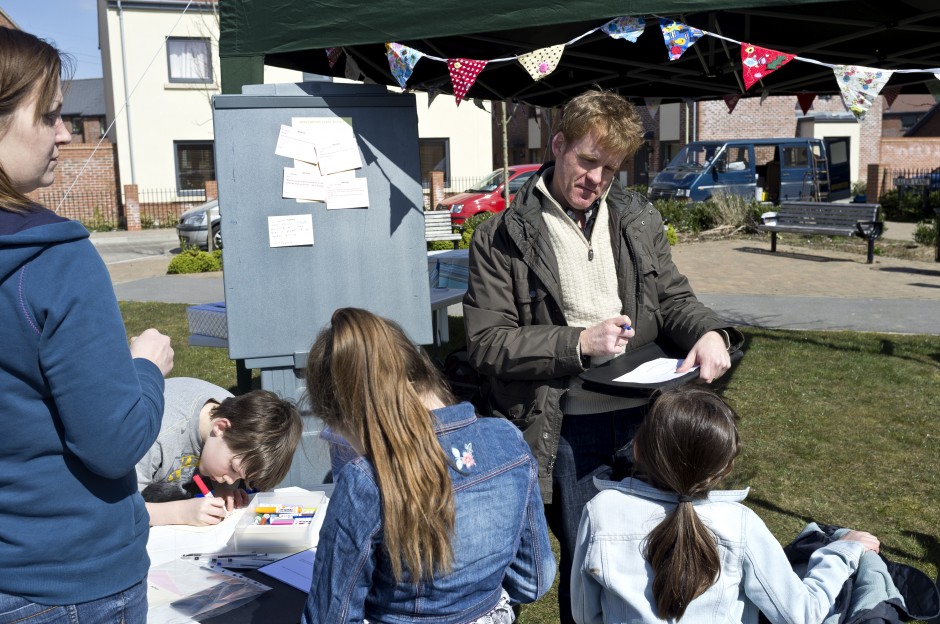‘West of Waterlooville’ is a huge new housing development taking place in the south-east part of Hampshire, and over the last year and a half I have been involved in the public arts project that went along with it.
When I was trying to think what category to put this post in – Creative Writing for Children? Hampshire Poet 2012? – I had a struggle. None of them seemed quite right; so in the end, I have gone for ‘Other’. And really, that’s just right for my involvement in this place: it has been something ‘Other’ than everything I usually do, and all the more interesting for that.
Spring last year. I drove over to the site to meet Clare, the organiser, and we talked about all kinds of exciting plans: a series of writing events, thronged to by residents of all ages, in which they wrote deeply-felt pieces about the power of naming (vanishing fields, new streets); how history can continue when a place is changed; what is lost in development, and how to preserve it. On that basis, I was booked for a series of workshops. Well, it didn’t turn out quite like that.
I kicked off with three afternoons in summer, on a green space at the edge of the estate. Clare had advertised them heavily on the fledgling estate, and we’d talked a lot about what I might expect: adults and children, parents and kids working together, maybe about 20 people. I planned how I would run such an event without a room; I’d never taught outside before.
When I turned up, I looked for the gazebo. It had blown over and broken in the morning. Then I looked for my 20 workshoppers. Well, there probably were about 20 people there, but they weren’t there for my workshop. They were the local kids – admittedly fulfilling the ‘range of ages’ requirement, since they went from 3 to 19 – who were only there because we happened to have pitched tent (or the absence of tent) in their muck-about zone. In some newspapers, these kids would quickly have been labelled ‘feral’, and indeed they felt that way when I started to try to teach. While some were keen, many had not the slightest interest in writing anything, especially not during their summer holidays. Most wandered off and came back several times. Virtually no-one did what I told them. At one point a football crashed into the table and about half the group went off to join it. It was not at all what I had planned for, and I felt rubbish.
Looking back now, I see there wasn’t really any reason to feel that way. The kids were on holiday, and hadn’t signed up for a workshop; why should they do some weird lesson, parachuted into their play area? And it wasn’t my fault I’d prepared the wrong thing: Clare and I had expected something totally different. And in fact, there was quite a lot of writing done on that first afternoon; just not as much, or of the kind, that I had anticipated.
So for other two afternoons, I adapted. For the first time in my teaching career, I devised activities designed for a drifting audience, an audience with little prior interest in writing, and a strong preference for ‘doing’ over ‘thinking’. I worked on activities that required little input from me, at least of the kind that would need classroom-style organisation and discipline. Some of my ideas bombed, but others worked; and by the end, I had got to know – and like – the kids.
The highlight of this section was the performance event that followed, in September. Lots of children read their work out, to an audience of friends, family and neighbours – surely the most nerve-wracking kind of group for a kid! – and they did really well. It was a really fun evening, bringing lots of people together, and made my suffering of earlier in the year worthwhile!
Next time I was there, I wrote a crowd-sourced poem, using the words of the residents to create a piece of writing in which I tried to sum up their feelings and concerns . I had done something like this before, but there was one crucial difference: I had to write my poem out for display on the community’s new noticeboard, by the end of the event. This meant a) working fast, and b) having to create not just the poem, but a neat copy! Anyone who’s ever seen my handwriting will know what a challenge that was.
What I liked about this event was meeting a wide cross-section of residents: adults as well as children this time, people who loved the new estate, people who hated it, and every shade of opinion in between. I enjoyed talking to them, and then trying to do justice to the range of their views in my poem. We may not have been talking about philosophically interesting ideas such as the rituals of naming, but it was important talk, about issues that mattered to them daily. I felt like a conduit. In the end I did it, and a copy of the poem is still up on the board now.

Lastly, the Saturday just gone, we had the final event. I got people to make a ‘word-montage-joiner’ of things about the estate, using four headings: ‘Out of my Window’, ‘Small Things That Matter’, ‘What Will Vanish’, and ‘High Spots and Low’. From the previous event I’d learned that people won’t always join in by themselves, but if I go and talk to them, be interested in what they have to say, then they will. So that’s what I did, and again I enjoyed it – even if the cold, damp weather was against us!
Writing without walls: at no point was there a wall around my work on this project. It was new, difficult, strange, exciting, challenging, warming, and made me grow as a teacher. To quote one person from Saturday: I’m glad I took part.


